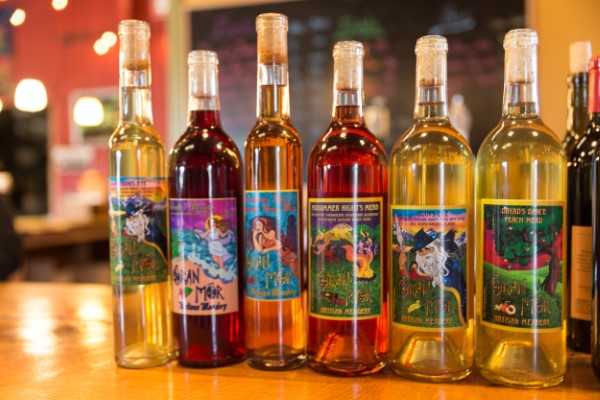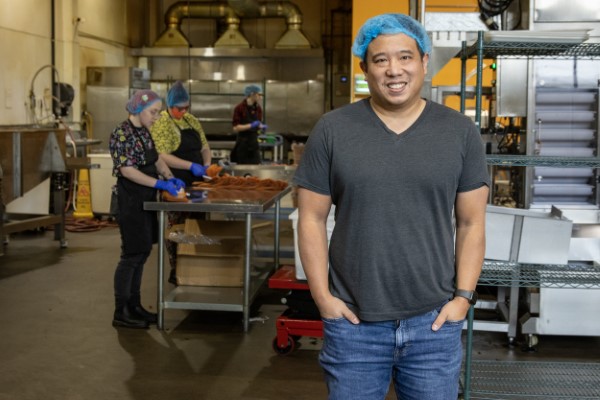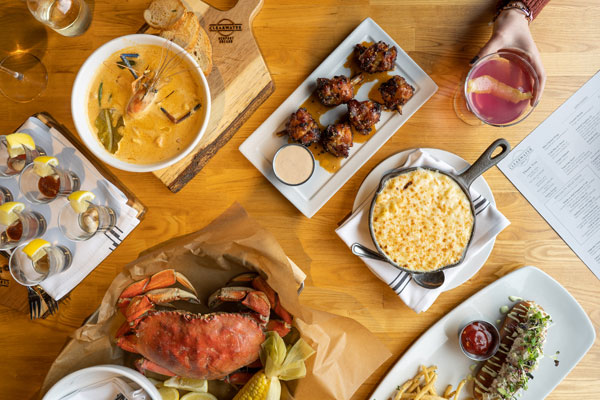Oregon is no stranger to food innovation. Many of America’s favorite treats were created in this corner of the Pacific Northwest. From artisanal cheeses and craft beers to the invention of the corn dog and tater tot, Oregon’s food scene is a testament to the state’s rich tradition of culinary creativity. Local entrepreneurs and chefs continue to come up with unique flavors and combinations, drawing on the region’s agricultural industry and resources to produce and package their products.
 Photos courtsey of Travel Oregon
Photos courtsey of Travel Oregon
Blossoming Ventures
When Michal Pan, founder and CEO of Pan’s Mushroom Jerky, traveled to Malaysia to visit family, he discovered a recipe had been passed down through generations of vegetarian Buddhists, setting the wheels in motion for his brand’s first product. Two years after the Portland-based company launched in 2018, Pan appeared on ABC’s “Shark Tank” and secured an investment of $300,000 with 18% equity from Mark Cuban.
Within 24 hours of the episode airing, the company sold nearly as much product as it did during the previous year alone. By day four, its online sales exceed $1 million.
And as popularity for plant-based foods has continued to grow, so has Pan’s. To support the company’s growth, it embarked on a facility expansion with the help of the Oregon Manufacturing Extension Partnership (OMEP).
Headquartered in the Portland area, OMEP provides manufacturers statewide with consultative and other services to maximize operational effectiveness, drive productivity, implement LEAN principles, leverage new technologies and address workforce challenges. When it came to aiding Pan through this process, the non-profit worked with the company to create a plan for the facility’s layout that aligned with its goals to expanded capacity.
Using a tool called the Value Stream Map (VSM), OMEP designed a layout that optimized processes based on constraints of the building and new equipment, removing as many non-value-added activities as possible to maximize the space’s functionality and efficiency.
The VSM’s technology also allowed the team to learn that were was room for improvement in the temperature sensor part of production. At that time, temperatures for formulas were taken by hand using candy thermometers and were not always reliable. To streamline this process the OMEP team implemented an Internet of Things (IoT) temperature sensor that automates measurements and reports data out at regular intervals.
OMEP created financial modeling to assist in equipment procurement, including IRR and ROI calculations as well as a functional system specification list for the machines needed.
Through the optimization of this expansion, Pan’s is now able to produce four times more jerky than it did before and doubled its manufacturing space. Now, Pan’s Mushroom Jerky’s six unique umami flavors can be found in over 3,500 stores nationwide, including Kroger, Whole Foods and Sprouts.
 Michael Pan, founder and CEO of Pan’s Mushroom Jerky.
Michael Pan, founder and CEO of Pan’s Mushroom Jerky.
Photo courtsey of Prosper Portland
Growing Success from the Ground Up
To support the continued growth of Oregon-based food innovators and agriculturists, Oregon State University was selected by the U.S. Department of Agriculture to co-lead a $30 million regional food business center that will help farmers, ranchers and other food-related businesses navigate new markets and access federal, state and local resources.
In partnership with Colorado State University, OSU will spearhead the Northwest and Rocky Mountain Regional Food Business Center, one of 12 new USDA centers in a $400 million initiative focused on supporting small and mid-sized farms and food businesses, specifically within historically underinvested and underserved communities in their regions. This location outreach will span across Colorado, Idaho, Montana, Oregon, Washington and Wyoming.
The Northwest and Rocky Mountain Regional Food Business Center has announced four initial focus areas:
- Strengthening local supply chains for animal proteins.
- Connecting and scaling food entrepreneurs.
- Supporting climate-resilient agriculture.
- “Right-sizing” investment and infrastructure.
By addressing each of these initiatives, OSU aims to mitigate many of the roadblocks farmers and food entrepreneurs face when scaling their businesses, such as growing too quickly or in the wrong location. The university already offers a national program called the Western Meat School, which educates small- and mid-scale meat and poultry companies on producing, financing, processing, marketing and pricing niche meat products, and plans to expand this program through the Center’s outreach.
“This is important recognition of the work we have been doing to build a strong local food economy in Oregon, in collaboration with farmers, food businesses, grassroots organizations and many other partners around our state,” said Lauren Gwin, director of OSU’s Center for Small Farms & Community Food Systems in the College of Agricultural Sciences and OSU Extension community food systems specialist in a statement. “We are excited to take this work to another level, here at home and across the West.”

